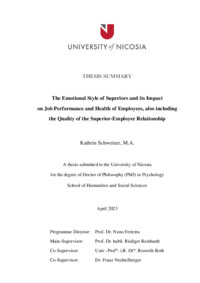- Schweizer, Kathrin
- 13 July 2023
- 650 pages
- Ferreira, Nuno | Reinhardt, Habil. Rüdiger | Roth, Roswith | Nechtelberger, Franz
- Emotional Style | Leaders | Superiors | Employees | Leadership | Job performance | Health | Quality of Superior-Employee-Relationship | LMX | Leader-Member Exchange | Organisational Context | Measurement Instrument
- Social Sciences -- Psychology
-
-
In view of rising expectations on employees in organisations, their job performance and health are increasingly coming into focus, including the role of their superiors. This thesis aimed to develop a measurement instrument to capture the emotional style of superiors, and to gain insights into its impact on the job performance and health of employees. In an organisational context, this was also investigated by including the quality of the superior-employee relationship as a mediating variable.
Based on literature research and a multi-stage research design (expert interviews in the qualitative pre-study, online survey in the quantitative main-study), an attempt was made to develop a measurement instrument for assessing the emotional style of superiors through the perception of employees. First, a six-dimensional measurement instrument was investigated (ES-6, 3 items per dimension). Results of an initial factor analysis indicated a poor model fit; it was subsequently adapted and confirmed as a two-dimensional measurement of the emotional style of superiors (ES-2, 13 and 3 items). A one-dimensional short scale for assessing the emotional style of superiors (ES-S), consisting of six single items, was also confirmed.
In multiple linear regression analyses, it was found that job performance (JP) and health (HE) of employees could be predicted by the measurement instruments of the emotional style of superiors (ES-6, ES-2, ES-S), when controlling for socio-demographic and occupational variables – both with and without the quality of the superior-employee relationship (LMX, Leader-Member Exchange) as a mediator. The LMX scale mediated most of the (sub-)scales of the emotional style of superiors (ES-6, ES-2, ES-S) and mainly took over the predictive power; the relevance of the leadership style LMX, which is mentioned in the literature, can therefore be confirmed and may thus be considered in future research. However, due to the low variance explanations of all research models (with and without including the superior-employee relationship/LMX), no impactful meaning for the organisational context could be demonstrated – modifications of the models are therefore necessary for the future.
-
The Emotional Style of Superiors and its Impact on Job Performance and Health of Employees, also including the Quality of the Superior-Employee Relationship
| Type | Location | Link |
|---|---|---|
| dissertation | [More information] |

